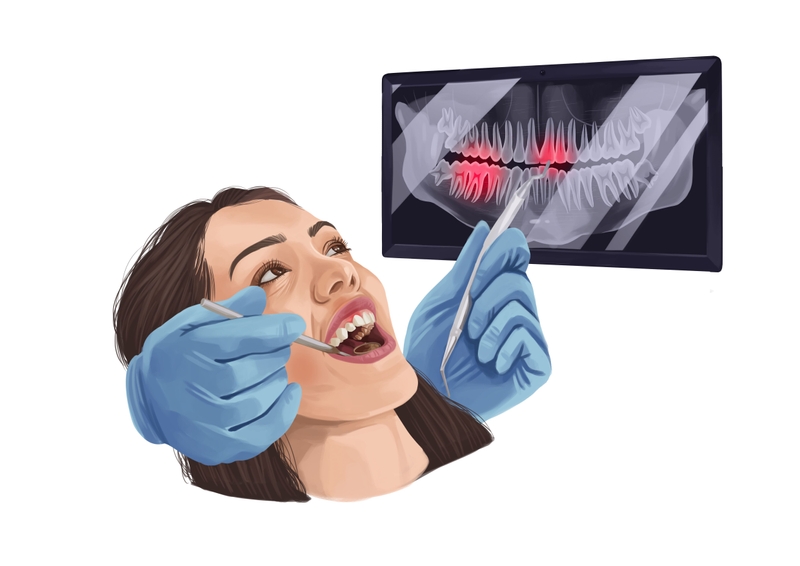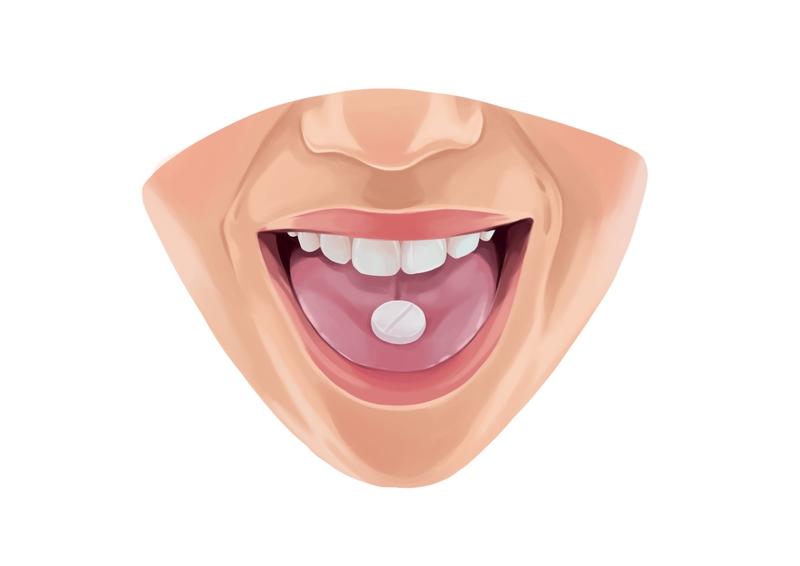- Tooth pain can be prevented by practicing proper oral hygiene, including brushing, flossing, and rinsing your mouth.
- A variety of factors can cause tooth pain, and your doctors should determine the best treatment based on the diagnosis.
- Home remedies for a toothache include taking over-the-counter pain relievers, using clove oil, and rinsing the mouth with a saltwater solution. Other options include applying a cold compress, sleeping in an elevated position, and adjusting your diet.
We are always ready to assist you in the event of a dental emergency. Use Authority Dental to search for local emergency dentists. We are open 24/7.
How to treat tooth pain and what home remedies may be helpful? Here is everything you need to know.
Toothache causes and treatment

Picture by Authority Dental under CC 2.0 license
When the nerve of a tooth is irritated, you feel pain. This may occur for various reasons, and there are different treatment options available for each case. If a dental issue causes the pain, your dentist will be able to relieve it.
First, the problem needs to be diagnosed. This will include a visual inspection and consultation, and some X-rays may be taken as needed. The dentist will then determine the best course of action to alleviate the pain.
Decay
This is the most common cause of tooth pain. Decay happens when you neglect to clean your teeth properly. Bacteria feed on remaining food particles in the mouth and produce acids that damage the enamel. The teeth may even crack during this process. Sometimes decay appears as brown or black spots.
Cavities are most often treated with a filling or, if it has reached the dental pulp, root canal treatment. If the decay has damaged an extensive portion of the tooth, you may receive a crown.
Infection
Infection in your mouth may induce a fever. This is the first indication that you may be dealing with a serious issue. It can develop due to poor oral hygiene, neglected tooth decay, and smoking. You are likely to experience swelling and the formation of pus pockets near your teeth. Such tooth infections often induce throbbing pain.
If a dental abscess is present, it will be drained, and you may need a course of antibiotics. Periodontitis may be treated with a scaling and root planing procedure.
Crack or fracture
Damage to teeth can take place upon trauma, untreated tooth decay, or biting into something hard. Some types of trauma may even need surgical intervention to make sure the pulp does not become infected. The damage is not always visible.
Broken tooth pain may be caused by the following matter getting inside through a crack or fracture:
food particles,
bacteria,
water or drinks, and
air.
The dental pulp should not come into contact with any of these substances. Your body’s way of letting you know something is wrong is pulsating pain. The tooth will require a cleaning, root canal, or extraction in more extreme cases. It may be closed off with a composite filling or a crown.
Impaction
Impacted teeth may not only lead to infection but also significant discomfort. When soft tissue or bone is in the way of tooth growth, the pressure can be excruciating. This is most common with wisdom teeth. Risk factors include:
remaining baby teeth,
cysts, and
genetics.
The gum and, sometimes, bone will have to be surgically opened. The tooth is removed, and while recovery may be painful, the problem will be resolved in the long term.
TMJ
Temporomandibular joint (TMJ) pain is often most prominent when patients open their mouths, usually during eating or yawning. The cause is often injury or inflammation of the temporomandibular joint. Treatment is particular, so accurate diagnosis is key.
If you suffer from TMJ or bruxism, your dentist might suggest a nightguard.
Dental work
Pain after a filling, tooth extraction, root canal treatment, or implant placement is common. Your dentist will inform you of the duration. It may be worse for 1-2 days when biting down as well. This can be normal.
If a restoration chips or cracks, it may also lead to some discomfort, which is a sign you should visit the office. It will be repaired, and the pain should subside.
Non-dental causes
Sometimes pain from other areas of your body may radiate to your mouth, especially the jaw region. The following conditions may cause a toothache or be confused with dental pain:
angina,
cluster headaches,
heart disease,
uncontrolled diabetes,
viral infections,
nerve disease,
drug abuse complications,
deficiency of vitamin B12,
sinusitis, and
ear infections.
In the case that the problem is not brought on by anything going on in your mouth, you may receive a prescription or referral to another medical professional.
Home remedies for a toothache

Picture by Authority Dental under CC 2.0 license
The best way to help with a toothache is to contact a dentist or doctor. If you do not have access to fast professional care, toothache home remedies might come in handy.
Try the following tips to stop tooth pain as quickly as possible.
Take OTC painkillers
The fastest way to remedy any pain in your body is to take medication. Some types also possess anti-inflammatory properties and may help reduce swelling. It is challenging to determine the best pain reliever for a toothache, as this may vary from person to person. Some great choices include taking ibuprofen and paracetamol, even for severe tooth pain.
If you need to take them for more than a few days, seek help from a professional. This is a cause for concern.
Use oil of cloves
Many dentists recommend using clove oil for toothaches. It is a natural pain reliever thanks to an active ingredient called eugenol. The oil also has anti-inflammatory properties, which may help reduce swelling. Soak a gauze pad with the oil and gently bite on it.

Rinse your mouth with saltwater solution
Dissolve a tablespoon of salt in a glass of warm water. Rinsing your mouth with this solution will remove any food debris left behind after meals. It is essential to keep your teeth clean, especially if you are experiencing decay or an infection. This tooth pain remedy may also help reduce swelling, which is sometimes the root of the problem.
Apply a cold compress
A cold compress applied to your cheek near the affected area may provide temporary relief from discomfort. Apply it for 20 minutes and take a 20-minute break. Repeat as necessary or convenient.
Sleep in a propped-up position
You might feel like your toothache is worse at night. It may come as a surprise, but this is not just a feeling; it is a dental fact. This happens because, as you lie down, blood rushes to your head, putting more pressure on the sore area. Stack pillows on top of each other and try to keep your head up while you sleep or lie down to avoid worse pain.
”I often explain it to my patients like this: think of an infected tooth as a badly sprained ankle trapped inside a steel boot,” Lee says. ”The inflamed nerve is the swollen ankle, and the hard, unyielding tooth is the steel boot. During the day, when you are standing, the pressure is already bad enough,” he continues.
”However, when you lie down flat, more blood flows to your head, increasing the pressure inside that confined space,” Lee emphasizes, adding that ”the 'ankle' swells even more inside the rigid 'boot,'" which is why you feel that intense, pulsating dental pain.”
Adjust your diet
Some foods and drinks may increase your pain or even make the problem worse. This mainly includes hot and cold meals and beverages. Anything sweet or sticky can get stuck in cracks and fissures, leading to a more serious issue.
Avoid bad habits
Both alcohol and smoking are risky when it comes to your oral health. It may introduce bacteria into your mouth, which, when combined with any decay or fracture, could lead to serious complications. Though it may seem like these substances may alleviate some pain, they may actually worsen the problem.
FAQ
What symptoms may arise with tooth pain?
The most common things you might experience when a tooth is hurting are sensitivity to hot and cold stimuli, pain upon chewing and biting, trouble swallowing, and bad breath. This discomfort will disappear when you target the problem.
If you also notice inflammation in the mouth, bleeding around the teeth, discoloration of the enamel, and fever or chills, you may be dealing with a more serious problem.
If any of the signs mentioned above last for longer than 3 days, they are unlikely to resolve on their own. You should contact a dental professional and seek help.
What is the best painkiller for toothache?
Ibuprofen (Motrin) is effective for toothaches, as it also possesses anti-inflammatory properties. Some patients, however, cannot take them. Your next choice should be paracetamol.
Why is my tooth pain worse at night?
As blood rushes towards your head when you lie down, more pressure is placed on the aching tooth. You may want to lie down a few pillows and try to sleep in a propped-up position.
How long can a toothache last?
There is no general time frame for a toothache. It all depends on the cause. The fastest way to relieve pain is to target the issue.
Can tooth pain go away by itself?
Sometimes, toothaches may subside, but the underlying issues persist. This means it can come back later, and worse. Stay up-to-date with regular check-ups to ensure your overall health is optimal.
References
- The Tooth Decay Process: How to Reverse It and Avoid a Cavity
- Persistent Fever Due to Occult Dental Infection: Case Report and Review
- Dental Pulp
- Correlation Between Height and Impacted Third Molars and Genetics Role in Third Molar Impaction
- TMJ (Temporomandibular Joint & Muscle Disorders)
- Drinking alcohol is associated with variation in the human oral microbiome in a large study of American adults
- Smoking and Periodontal Disease
Harry Lee, DMD
There is a reason so many of our dental emergency calls come in after midnight. A toothache that was just a dull annoyance during the day can become an unbearable, throbbing nightmare when your head hits the pillow. It is not your imagination; it is simple physics.